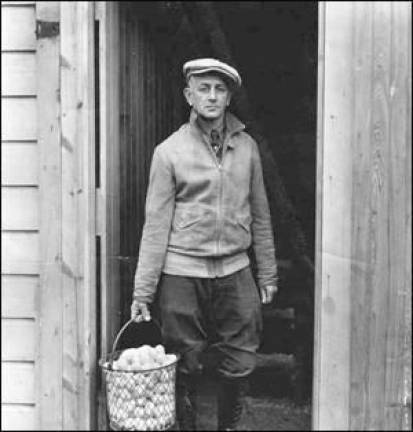Sugar Loaf makes history

Natural history to be major focus of newly incorporated historical society, By Vicki Botta Sugar Loaf Sugar Loaf’s long and distinguished history will become better known, thanks to a newly formed historical society in town. On Jan. 9, the Sugar Loaf Historical Society was granted incorporation by the New York State Education Department’s Board of Regents, according to Holly Zdrodowski, secretary of the new society. “We are so excited,” said Jay Westervelt, historical society president. “It’s been some time since a new historical society has been chartered in Orange County, and many residents of Sugar Loaf, especially those whom have resided in the hamlet prior to the early 1970s to present craft-village identity, have been anxious to see the hamlet’s actual history disseminated and preserved.” Westervelt, who communicated via the Internet while wintering in Europe, described the organization as more concerned with education and preservation than simply grant-procurement. “No grant-fever’ in this organization,” he said. It is a not-for-profit educational corporation unaffiliated with any other organization in Sugar Loaf. Incorporation entails much paperwork and board participation, according to Westervelt, who said the society is very fortunate to have such a dynamic and positive board willing to take on the enormous responsibility. “Sugar Loaf actually predates the Town of Chester,” Westervelt said, “and is historically a hamlet of Warwick as well. With this incorporation, buildings can be placed on historic registers, and our marker program can move forward with bona fide state markers.” The new society will not be able to prevent encroaching development from changing the character of the hamlet. “We can act only in an advisory capacity,” Westervelt said. “However, unlike an ad hoc community group, our intel and suggestions will be from a strictly educational perspective, and less driven by commercial or homeowner interests.” He said the hamlet’s character was already changed, dramatically, when the craft stores of the late 20 century began the modern “Craft Village” era of Sugar Loaf, said Westervelt, who was in grade school at the time. The historical society will offer smart-growth suggestions for the reducing impact on sites of historical and natural historical interest. But aside from edification and suggestions, efforts will be limited as warranting an educational corporation. While awaiting their official incorporation, society members been designing a number of historical markers and taking small groups, primarily youngsters, on nature hikes and canoe tours inside and immediately surrounding the hamlet. They want to broaden this program with activities directly relating to these treks. They plan to erect a bluebird trail, with nestboxes, along the fenceline at Chester’s town park property at Bairdlea Farm, along with a purple martin nestbox and one on the Orange County property along Pine Hill road. With landowners’ permission, they will establish a small cleanup program for area cemeteries, while making a project for young people to do pencil etchings of epitaph inscriptions. They also intend to publish more bookmarks in their historical bookmark series, each detailing an example of local folklore, and will likely publish a pamphlet of Sugar Loaf’s historical facts and treasures, and a more comprehensive treatise. The organization plans to offer historical lectures and hire professional storytellers who ply their trade in period garb, to work at special events. The organization has six officers and many members. Membership to date has been free, but a small fee will be charged in the future. The officers believe their organization is different from many historical societies in that it is strongly web-based, with computer-savvy officers with technical expertise. They have written into their corporate purposes natural history education and preservation, along with historical education. This will expand the society’s ability to inherit, by gift or other means, buildings and tracts of land with special historical or natural interest. While Westervelt believes the Land Trust of Orange County is “outstanding,” he said the society must limit its acquisitions to rather large tracts. “Our corporation will have the ability to inherit, preserve, and curate tiny tracts of sensitive land that developers and landowners might find otherwise useless,” he said. While the corporation is a separate entity from that of the Chester Historical Society and the Historical Society of the Town of Warwick, Sugar Loaf expects good cooperation with both organizations in the future. “Indeed, Warwick’s own historical society has been extremely helpful with us,” Westervelt said. “Our organization was begun, primarily, by residents such as myself, who lived here prior to the craft era of the early 1970s, when the hamlet’s village was, simply, a peaceful collection of historic homes with a post office, general store, and a church ... and, typically, several saloons,” he added. “As such, we have the participation and input of old-timers’ who remember the pre-commercial days of our little home hamlet.” For more information, visit www.sugarloafhistoricalsociety.com